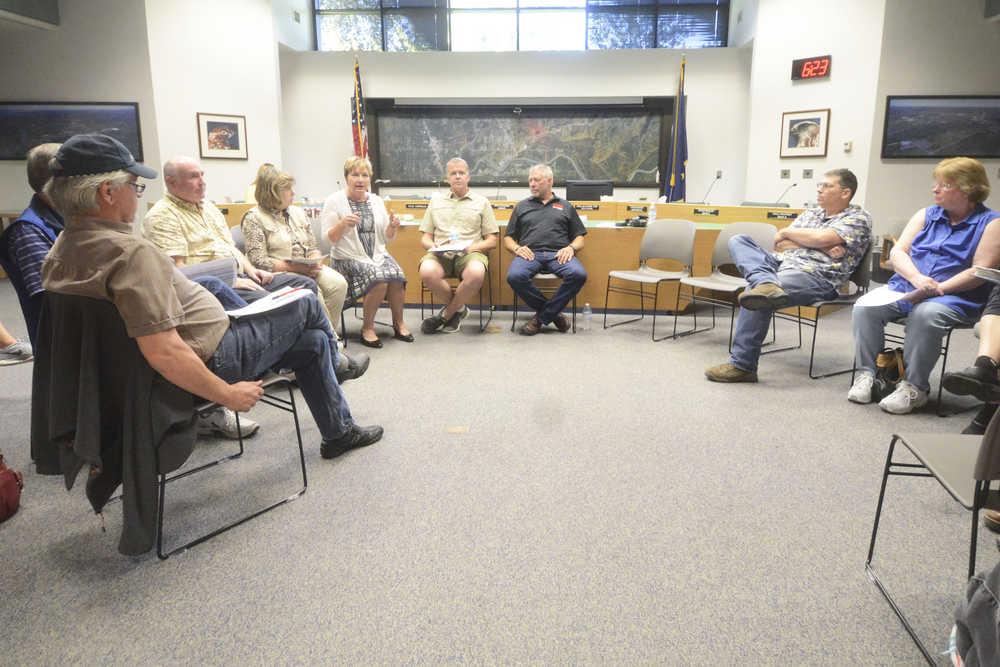In the second of two efforts to reach the public concerning a proposed home-rule charter, the Soldotna Charter Commission answered questions Tuesday evening during an open house at Soldotna City Hall.
A home-rule charter drafted by the seven-member commission is on the ballot for the upcoming Oct. 4 regular municipal election. If Soldotna voters approve the charter, it will take effect when the election is certified. If they vote it down, the commission has another year to come up with another charter, which residents would also have to vote on.
Soldotna residents have voted down efforts to create a charter commission in the past. However, the majority of city residents voted to keep the city’s year-round sales tax on groceries in last year’s October election when it was removed by a borough-wide majority vote.
Commission members have said that being able to reinstate the year-round sales tax to avoid raising Soldotna’s mill rate and putting more burden of raising revenue on city residents was a large motivator for the citizen’s initiative that brought the home-rule question forward. However, they have maintained that being a home-rule city will give Soldotna more autonomy from the Kenai Peninsula Borough and will put more power in the hands of voting residents.
Current city structure
Soldotna is a first-class general law community. As such, it “has legislative powers conferred by law,” according to Title 29 of Alaska Statute.
Commission member Linda Murphy said at a Soldotna Chamber of Commerce luncheon Tuesday the commission left the proposed home-rule charter intentionally generic so as to avoid anything too specific that might have to be changed later to comply with changing state law. Nothing about Soldotna’s current city code was changed in the proposed charter, commissioners said at Tuesday’s open house.
“The charter was looked at very carefully to match the code,” said commission member Dale Bagley at the open house.
The municipal sales tax chapter of Soldotna’s city code states a 3 percent sales tax is “levied upon all sources taxed by the Kenai Peninsula Borough, and in the manner provided by the borough in its present borough code of ordinances.” When the majority of borough residents voted to repeal the year-round sales tax on nonprepared food items, the city of Soldotna followed suit as a first-class general law city, even though the majority of Soldotna residents voted to keep that tax.
Home-rule cities, such as Kenai, can set their own sales tax and are not bound to collect it in the same manner as the borough.
As it operates now, the Soldotna City Council consists of six elected members and one mayor, who does not have regular voting power but can break ties. Though the possibility of having a mayor with full council powers, but no veto powers, was discussed while drafting the charter, the commission ultimately voted to keep the council’s current structure the same.
Under home rule
If Soldotna were to join the ranks of other home-rule cities and boroughs in the state, it would enjoy slightly more powers than a general law community.
“A home rule municipality has all legislative powers not prohibited by law or charter,” according to Title 29.
As a home-rule city, Soldotna could set its own sales tax structure, as well as dictate other taxation issues that could come up separately from the borough, commissioners said at the open house. In section six of the commission’s proposed charter under “Taxation Powers,” it states that “The city shall have all powers of taxation which home rule cities may have under the state constitution and law.”
If approved, Soldotna’s home-rule charter could not be changed by the city council alone, but by a vote of the residents during an election. The question to change the charter could be put on a ballot by the city council or by citizen initiative.
Commission member Tim Cashman said when commission members reached out to other home-rule communities to get copies of their charters for reference, they also asked whether any of them would consider going back to their general law status.
“Nobody would go back,” Cashman said. “And they have a future. Their future is now because they have a past. Nobody who’s a home-rule community that we could find anywhere would revert back to a first-class city or general law community. It’s just not something they would do.”
One issue brought up at the open house was that, while people seem to understand that taxation is the big issue prompting the push for home rule, some residents are curious about other ways the city could deviate from the borough in future scenarios. Commission members said they believe most of the differences between home-rule and general law communities have to do with taxation and diversifying options for generating revenue.
Being a home-rule city could help Soldotna make itself more friendly to businesses, said Commission Chair Scott Davis.
Commission members closed the open house by pondering how best to get information out to voters before the election.
“I think that we have to make it clear, too, that they’re going to be paying more … if we can’t get that sales tax back,” Murphy said. “That in the end, city residents are going to be paying more than if we … had the sales tax.”
Reach Megan Pacer at megan.pacer@peninsulaclarion.com.

